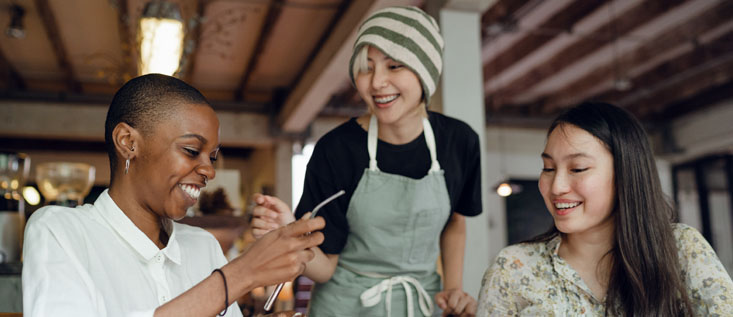After a year of social isolation, returning to face-to-face “real life” interaction from virtual gathering can be as anxiety-inducing as it is exhilarating. As the CDC has lifted key requirements in its mask mandate, and nearly half of eligible Americans have been fully vaccinated, a cautious optimism has sprung up across the country that sings “closer to being closer.”
For many, this is the moment we’ve been waiting for. A time to reunite fully with family and friends, a time to travel, a time to return to work, or a time to simply breathe in a moment of peace. So where do we go from here? The question itself is disorienting when each person has experienced life in the pandemic differently.
Some were more isolated than others, while others socially distanced together in a large, shared home. Some experienced grave loss at the hands of COVID-19, while others were blessed with new opportunities. Some felt deep mental, emotional, or financial instability for the first time, while others were finally forced to press pause on their busy lives to evaluate the direction they wanted to head next.
As social beings who crave human connection but who have adjusted to life online and keeping 6 feet apart, we will no doubt need a learning curve to gathering again. When pre-pandemic, we didn’t have to think twice about bookending an interaction with a handshake or hug, now we second guess everything. But when moments of this new form of social anxiety arise, fear not! These six practices for dusting off your social skills will help you get through it.
- Readjust slowly.

Set small, achievable, and realistic goals for the interactions in which you choose to participate, based on your comfort level. Don’t compare yourself with how others are coming out of the cocoon; you’ll be less overwhelmed if you make careful, decisive choices. Maybe that means limiting the times you meet up with friends at a restaurant for the month or politely declining a wedding invitation if it means traveling far before you’re ready. Whatever the occasion for socializing might be, lean into what feels right for you, at this moment, and hope that others will be understanding.
- Feel empowered to plan ahead.

The pandemic uprooted something central in the function of human connection, the notion of normalcy. It made it very difficult to plan ahead when we couldn’t see past what was going on in the day to day. Planned trips: cancelled. Concerts and events: postponed. A return date to work: TBD. Now that things are looking up, why not practice planning with optimism, in anticipation of normalcy? Think of something you love to do (or would want to do) that you haven’t been able to, and someone you would enjoy experiencing that with. That might look like going to the movies, having a weekend at the beach, or booking an international vacation for the fall. Whatever it is — plant a seed of hope in the invitation!
- Remember individual differences.

As humans, we are inherently born with free will. God gave us free will, so shouldn’t we show our brothers and sisters the same grace when they make choices that go against our personal convictions? One of the hot-button questions being asked now is, “Are you vaccinated or not?” Yet instead of letting that become a divisive point, why not view it as a choice that everyone gets to make for themselves? In the same breath, just because one person is ready to travel and hop back on a plane doesn’t mean someone else is; and that’s OK. Respect what makes us unique.
- Pray for peace when anxiety arises.
Whether you were an introvert, extrovert, or introverted extrovert before the year of apartness hit, coming back onto the social scene can bring up a new level of social anxiety. You may be thinking to yourself, “I feel awkward interacting with people again,” and that’s a perfectly normal thought to have. Social interaction is like a muscle that gets exercised with every new interaction, and the person on the other side of the table is likely feeling just as ill-prepared as you are. So, when discomfort and anxiety pop up, and you start worrying about being too physically close or find yourself stumbling to get your thoughts out, invite peace into the conversation.
- Have a list of insightful prompts ready.

As they say, preparation is the key to confidence. Whether you’re reconnecting with an old friend or striking up a conversation with a stranger, having a few questions in your back pocket ready to ask can be helpful. For example: Try asking someone what music or podcasts they’re listening to right now, or about a good book they’ve read in the last year. This social exercise not only helps you exchange creative outlets but gives you a closer insight into what makes that person tick. You also can help shed positive light onto a difficult year by asking something like “What have you learned about yourself in this past year?” and let the conversation flow from there.
- Break bread together.

Pandemic or not, the joy of food has always bonded us to one another. When we share a meal with someone, we create a safe (and hopefully delicious!) space for conversation, storytelling, and closeness. Besides, it doesn’t take much to get someone to meet you out for a great meal! When you’re looking for an antidote for loneliness and an easy way to achieve in-person interaction again, break bread together. If you don’t feel comfortable being indoors at restaurants just yet, reconnect with friends and family for an outdoor picnic or host someone at your home for dinner. However you choose to break bread, do it with the intention of creating a beautiful bonding experience.






